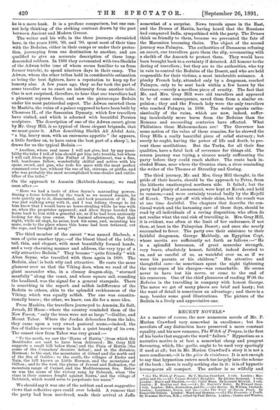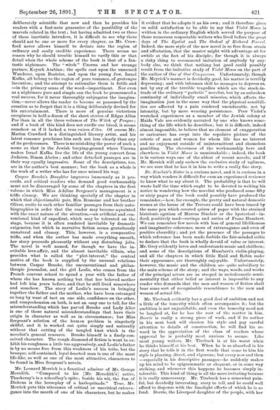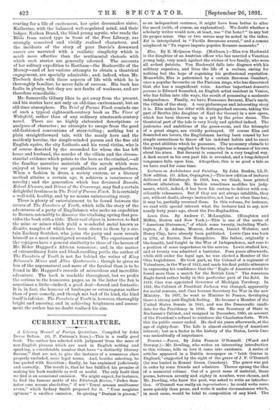RECENT NOVELS.*
As a matter of course, the now numerous novels of Mr. F. Marion Crawford vary somewhat in excellence ; but few novelists of' any distinction have preserved b. more constant equality, and his new romance, The Witch of Prague, is the first of his books that suggests the word " failure." Hypnotism as a narrative motive is at best a somewhat cheap and pungent flavouring, which, like garlic, ought to be used very sparingly if used at all ; but in Mr. Marion Crawford's story it is not a mere condiment,—it is the piece de resistance. It is not enough to say that hypnotism enters much too largely into the scheme of the book ; there is really nothing else in it : it is of hypnotic hocus-pocus all compact. The author is so wilfully and • (1.) The Witch of Prague. By F. Marion Crawford. 3 vole. London : Mae. millan and Co.—(2.) Caspar Brooke's Daughter. By Adeline Sergeant. 3 vols. London Hurst and Blackett.—(3.) Violet Moses. By Leonard Merriok. 3 vols. London R Bentley and Son.—(4 ) Dr. Sinclair's Sister. By Edward Grey. 3 vols. London : Eden, Flemington, and Co.—(5.) Dorrie. By William Tirehnek. London Longman. Green, and Co.—(6.) The Trial of.Parson Finch. By Somerville Gibney. London Ward and Downey.(7.) The Fountain Youth. By Erasmus Dawson, M.B. ; edited by Paul Devon. London Chatto and Windus.
deliberately scientific that now and then be provides his readers with a foot-note guarantee of the possibility of the
marvels related in the text ; but having admitted two or three of these inartistic intruders, it is difficult to see why there should not be one or more for every chapter, as Mr. Craw- ford never allows himself to deviate into the region of ordinary and easily credible experience. There seems no reason why he should trouble himself to verify this or that detail when the whole scheme of the book is that of a fan- tastic nightmare. The "witch" Unorna and her strange -partner, Keyork Arabian ; the spells cast upon the unnamed Wanderer, upon Beatrice, and upon the young Jew, Israel Kafka, all belong to the region of pure romance, of grotesque invention; and the attempt to rationalise them is futile and —in the primary sense of the word—impertinent. Nor even as a nightmare pure and simple can the book be pronounced a real success, for it never thoroughly subjugates the imagina- tion,—never allows the reader to become so possessed by the creation as to forget that it is a thing deliberately devised for his entertainment. There is more of genuine victorious creepiness in half-a-dozen of the short stories of Edgar Allan Poe than in all the three volumes of The Witch of Prague ; and if a book of this kind does not curdle our blood, it seems somehow as if it lacked a true raison d'are. Of course Mr. Marion Crawford is a distinguished literary artist, and his latest romance proclaims him such not less clearly than any of its predecessors. There is no mistaking the power of such a scene as that in the Jewish burying-ground where Unorna makes Israel Kafka live the life of the young convert from Judaism, Simon Abeles ; and other detached passages are in their way equally impressive. Some of the descriptions, too, are in the author's best manner; but the book as a whole is the work of a writer who has for once missed his way.
Caspar Brooke's Daughter improves immensely as it pro- ceeds, and critical readers who demand good workmanship must not be discouraged by some of the chapters in the first volume in which Miss Adeline Sergeant's management is a trifle clumsy. We are thinking specially of the chapter in which that objectionable pair, Mrs. Romaine and her brother Oliver, recite to each other familiar passages from their auto- biographies in order that the reader may become aquainted with the exact nature of the situation,—an artificial and con- ventional kind of expedient, which may be tolerated on the Stage, because it is often rendered inevitable by dramatic exigencies, but which in narrative fiction seems gratuitously unnatural and clumsy. This, however, is a comparative trifle, and when the author has made everything smooth, her story proceeds pleasantly without any disturbing jolts. The novel is well named, for though we have the in- evitable love-affair, and the almost inevitable villain, who provides what is called the " plot-interest," the central motive of the book is supplied by the unusual relations between Caspar Brooke, the unconventional and philan- thropic journalist, and the girl Leslie, who comes from the French convent school to spend a year with the father of whom she has known nothing but that her beloved mother had left him years before, and that he still lived somewhere and somehow. The story of Leslie's success in bringing together the father and the mother, who have been estranged so long by want of tact on one side, confidence on the other, and comprehension on both, is not an easy one to tell, for the misunderstanding which has parted Brooke and Lady Alice is one of those natural misunderstandings that have their origin in character as well as in - circumstance; but Miss Sergeant's solution of the human problem is singularly skilful, and it is worked out quite simply and naturally without that cutting of the tangled knot which is the novelist's general resource. Brooke himself is a finely-con- ceived character. The rough diamond of fiction is wont to ex- hibit his roughness a little too aggressively, and Leslie's father is by no means free from this weakness of his tribe, but the brusque, self-contained, loyal-hearted man is one of the most life-like, as well as one of the most attractive, characters to be found in Miss Sergeant's novels.
Mr. Leonard Merrick is a fanatical admirer of Mr. George Meredith. " Compared to his [Mr. Meredith's] satire, Thackeray's is a schoolboy's spite ; beside his wit, the fun of Dickens is the horseplay of a harlequinade." True, Mr. Merrick puts this utterance of critical or uncritical extrava- gance into the mouth of one of his characters, but he makes it evident that he adopts it as his own ; and it therefore gives us solid satisfaction to be able to say that Violet Moses is written in the ordinary English which served the purpose of those numerous respectable writers who lived before the great days of The Egotist and The Ordeal of Richard Feverel. Indeed, the mere style of the new novel is so free from strain and affectation, that the master might with advantage sit for awhile at the feet of his disciple ; for though it is always a risky thing to recommend imitation of anybody by any- body else, we think that nothing but good could possibly result from the imitative study of Violet Moses on the part of the author of One of Our Conquerors. Unfortunately, though Mr. Meyrick's manner is decidedly good, his matter is terribly depressing; and with inhuman skill he manages to depress us, not by any of the terrible tragedies which are the stock-in- trade of the ordinary " pathetic" novelist, but by an unbroken continuity of individually small miseries, which affects the imagination just in the same way that the physical sensibili- ties are affected by a pain rendered unendurable, not by intensity, but by mere wearing persistence. Poor Violet's wretched experiences as a member of the Jewish colony at Maida Vale are evidently narrated by one who knows some- thing of the life which he describes; but it is difficult, indeed almost impossible, to believe that no element of exaggeration or caricature has crept into the repulsive picture of the coterie of men and women for whom life has no interest and no enjoyment outside of unintermittent and shameless gambling. The cleverness of the workmanship here and elsewhere in Violet Moses is unmistakable ; indeed, the book is in various ways one of the ablest of recent novels; and if Mr. Merrick will only eschew the exclusive study of ugliness, we are sure that he has it in him to write a really fine story.
Dr. Sinclair's Sister is a curious novel, and it is curious in a way which renders it difficult for even an experienced reviewer to know what to say about it. The probability is that he will waste half the time which ought to be devoted to writing his notice in wondering how the novelist who produced some fifty or sixty pages of the book could possibly have produced the remainder,—how, for example, the pretty and natural domestic scenes at the house of the Trevors could have been traced by the same pen which covered quires of paper with the strained histrionic egotism of Marcus Sinclair or the hysterical—in- deed, positively mad—ravings and antics of Franz Humbert. We can remember few novels with less of general lifelikeness and imaginative coherence, more of extravagance and even of positive absurdity ; and yet the presence of the passages to which reference has been made forbids the fair-minded critic to declare that the book is wholly devoid of valve or interest. Mr. Grey evidently loves and understands music and children; and some of the descriptions of Humbert's violin-playing, and all the chapters in which little Enid and Robin make their appearance, are thoroughly enjoyable. Unfortunately, however, the music and the children are quite subsidiary to the main scheme of the story ; and the ways, words, and works of the principal actors are so steeped in melodramatic senti- mentality that either belief or interest is impossible to any reader who demands that the men and women of fiction shall bear some sort of recognisable resemblance to the men and women of actual life.
Mr. Tirebuck evidently has a good deal of ambition and not a little of the temerity which often accompanies it ; but the ambition is not unjustifiable, and even the temerity need not be laughed at, for he has the root of the matter in him. Dorrie is really a strong piece of work, and if its author in his next book will chasten his style and pay careful attention to details of construction, he will find his re- ward in the appreciation of the class of readers whose approval he is probably most anxious to secure. Like most young writers, Mr. Tirebuck is at his worst when he thinks himself at his best. When he is so absorbed in his story that he tells it in the first words that come to him his style is pleasing, direct, and vigorous; but every now and then —especially in his descriptive passages—he suddenly makes up his mind to be epigrammatic or eloquent, or in some way striking, and whenever this happens he becomes simply in- tolerable. This kind of thing is all the more irritating because it is really unnecessary. Mr. Tirebuck has a somewhat pain- ful, but decidedly interesting, story to tell, and he could well afford to dispense with the limelight effects of which he is so fond. Dorrie, the Liverpool daughter of the people, with her
craving for a life of excitement, her quiet dressmaker sister, Katherine, with the balanced well-regulated mind, and their lodger, Nathan Brand, the blind young mystic, who reads the Bible from raised type in front of the Free Library, are strongly conceived and vividly .realised characters, and the incidents of the story of poor Dorrie's downward career are narrated with a realistic simplicity -which is much more effective than the sentimental rhetoric with which such stories are generally adorned. The accounts of her solitary expedition to Eastham—the Rosherville of the Mersey—and of her various attempts to obtain a theatrical engagement, are specially admirable ; and, indeed, when Mr. Tirebuck deals with those aspects of life with which he is thoroughly familiar, he never fails of success. His book has faults in plenty, but they are not faults of weakness, and are therefore remediable.
Mr. Somerville Gibney likes to get away from the present, and his stories have not only an old-time environment, but an old-time atmosphere. The Trial of Parson Finch reminds one of such a typical eighteenth-century book as The Vicar of Wakefield, rather than of any ordinary nineteenth-century novel. There are no highly elaborated descriptions or analyses of character ; no attempts to escape from the good old-fashioned conventions of story-telling ; nothing but a plain straightforward tale, with the manly hero. and the maidenly heroine, the simple-minded parson and the fine old English squire, the city Lothario and his rural victim, who is of course deserted by the scoundrel for whom she has left home and husband, the murder of the villain and the circum- stantial evidence which points to the hero as the criminal,—all the familiar narrative materials of the novels which were enjoyed at leisure by our grandfathers and grandmothers. When a fashion in dress, a society custom, or a literary method attains a certain age, it achieves a renaissance of novelty ; and the generation which has devoured Romola, Robert ElsInere, and Diana of the Crossways, may find a certain delightful freshness in The Trial of Parson Finch. It is certainly a well-told, healthy, and by no means uninteresting story.
There is plenty of entertainment to be found between the covers-of The Fountain of Youth, which tells the story of the adventures of a party of Englishmen who make an expedition to Borneo, ostensibly to discover the vitalising spring that pro- vides the book with a title. Their real object is, however, to find the mine or mines which yield a wonderful metal known as dianite, samples of which have been shown to them bya cer- tain Zachary Scutcher, who joins the party and soon reveals himself as a most unmitigated scoundrel. The experiences of the voyagers have a general similarity to those of the heroes of Mr. Rider Haggard's African romances ; and, in the matter of extraordinary feats and blood-curdling perils, the author of The Fountain of Youth is not far behind the writer of King Solomon's Mines and Allan Quatermain ; though he gives us less of the supernatural and more of the farcical than is to be found in Mr. Haggard's records of miraculous and incredible adventure. The book is readable throughout, but we prefer the serious to the humorous pages, as in the latter the fan is sometimes a little—indeed, a good deal—forced and fantastic. It is, in fact, the humour of burlesque or extravaganza rather than of pure comedy, and though not bad of its kind, the kind itself is inferior. The Fountain of Youth is, however, thoroughly bright and amusing, and in achieving brightness and amuse- ment the author has no doubt realised his aim.




































 Previous page
Previous page